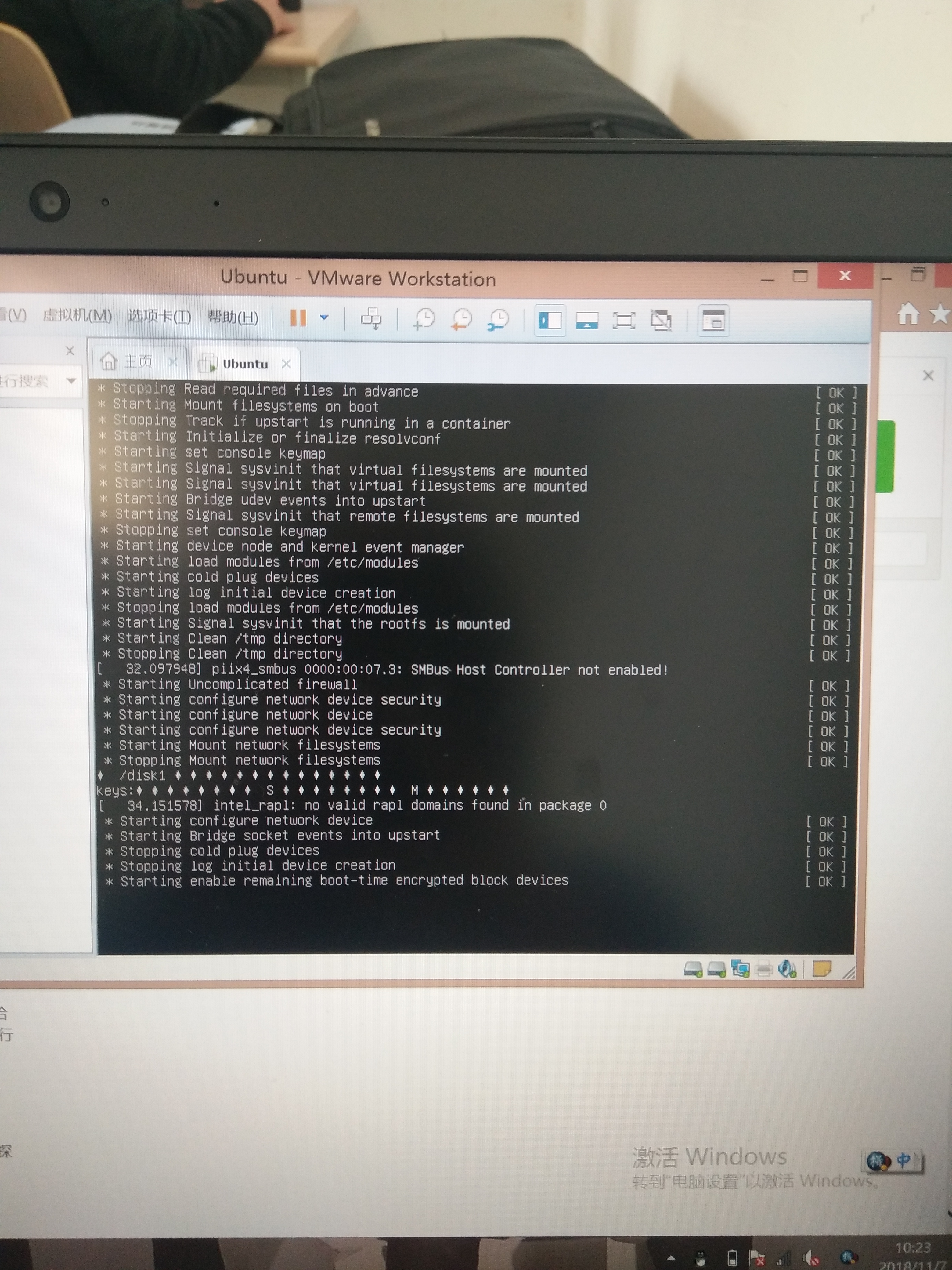可以将文章内容翻译成中文,广告屏蔽插件可能会导致该功能失效(如失效,请关闭广告屏蔽插件后再试):
问题:
I have a UIWebView in my app which I want to use to display an image which will link to another url.
I\'m using
<img src=\"image.jpg\" /> to load the image.
The problem is that the image doesn\'t load (ie. it can\'t be found) even though it\'s added as a resource in my project and is copied into the bundle.
I\'ve tried using NSBundle to get the full path of the image and using that and it still doesn\'t show up in the web view.
Any ideas?
回答1:
Using relative paths or file: paths to refer to images does not work with UIWebView. Instead you have to load the HTML into the view with the correct baseURL:
NSString *path = [[NSBundle mainBundle] bundlePath];
NSURL *baseURL = [NSURL fileURLWithPath:path];
[webView loadHTMLString:htmlString baseURL:baseURL];
You can then refer to your images like this:
<img src=\"myimage.png\">
(from uiwebview revisited)
回答2:
Use this:
[webView loadHTMLString:htmlString baseURL:[[NSBundle mainBundle] bundleURL]];
回答3:
I just ran into this problem too. In my case, I was dealing with some images that were not localized and others that were--in multiple languages. A base URL didn\'t get the images inside localized folders for me. I solved this by doing the following:
// make sure you have the image name and extension (for demo purposes, I\'m using \"myImage\" and \"png\" for the file \"myImage.png\", which may or may not be localized)
NSString *imageFileName = @\"myImage\";
NSString *imageFileExtension = @\"png\";
// load the path of the image in the main bundle (this gets the full local path to the image you need, including if it is localized and if you have a @2x version)
NSString *imagePath = [[NSBundle mainBundle] pathForResource:imageFileName ofType:imageFileExtension];
// generate the html tag for the image (don\'t forget to use file:// for local paths)
NSString *imgHTMLTag = [NSString stringWithFormat:@\"<img src=\\\"file://%@\\\" />\", imagePath];
Then, use imgHTMLTag in your UIWebView HTML code when you load the contents.
I hope this helps anyone who ran into the same problem.
回答4:
I had a simmilar problem, but all the suggestions didn\'t help.
However, the problem was the *.png itself. It had no alpha channel. Somehow Xcode ignores all png files without alpha channel during the deploy process.
回答5:
try use base64 image string.
NSData* data = UIImageJPEGRepresentation(image, 1.0f);
NSString *strEncoded = [data base64Encoding];
<img src=\'data:image/png;base64,%@ \'/>,strEncoded
回答6:
You can add folder (say WEB with sub folders css, img and js and file test.html) to your project by choosing Add Files to \"MyProj\" and selecting Create folder references. Now the following code will take care about all the referred images, css and javascript
NSString *filePath = [[NSBundle mainBundle] pathForResource:@\"WEB/test.html\" ofType:nil];
[webView loadRequest:[NSURLRequest requestWithURL:[NSURL fileURLWithPath:filePath]]];
回答7:
In Swift 3:
webView.loadHTMLString(\"<img src=\\\"myImg.jpg\\\">\", baseURL: Bundle.main.bundleURL)
This worked for me even when the image was inside of a folder without any modifications.
回答8:
After having read a couple of chapters in the iOS 6 Programming Cookbok and started to learn objective-c and iOS programming, I would just like to add, that if one is going to load resources from a custom bundle and use that in a web view, it can be accomplished like this:
NSString *resourcesBundlePath = [[NSBundle mainBundle] pathForResource:@\"Resources\" ofType:@\"bundle\"];
NSBundle *resourcesBundle = [NSBundle bundleWithPath:resourcesBundlePath];
[self.outletWebView loadHTMLString:[html description] baseURL:[resourcesBundle bundleURL]];
Then, in your html you can refer to a resource using the \"custom\" bundle as your base path:
body {
background-image:url(\'img/myBg.png\');
}
回答9:
Swift version of Adam Alexanders Objective C answer:
let logoImageURL = NSURL(fileURLWithPath: \"\\(Bundle.main.bundlePath)/PDF_HeaderImage.png\")
回答10:
If you use relative links to images then the images won\'t display as all folder structures are not preserved after the iOS app is compiled. What you can do is convert your local web folder into a bundle instead by adding the \'.bundle\' filename extension.
So if you local website is contained in a folder \"www\", this should be renamed to \"www.bundle\". This allows the image folders and directory structure to be preserved. Then load the \'index.html\' file into the WebView as an HTML string with \'baseURL\' (set to www.bundle path) to enable loading relative image links.
NSString *mainBundlePath = [[NSBundle mainBundle] resourcePath];
NSString *wwwBundlePath = [mainBundlePath stringByAppendingPathComponent:@\"www.bundle\"];
NSBundle *wwwBundle = [NSBundle bundleWithPath:wwwBundlePath];
if (wwwBundle != nil) {
NSURL *baseURL = [NSURL fileURLWithPath:[wwwBundle bundlePath]];
NSError *error = nil;
NSString *page = [[NSBundle mainBundle] pathForResource:@\"index.html\" ofType:nil];
NSString *pageSource = [NSString stringWithContentsOfFile:page encoding:NSUTF8StringEncoding error:&error];
[self.webView loadHTMLString:pageSource baseURL:baseURL];
}
回答11:
These answers did help me -- specifically the file:\\\\xxxxxxx.xxx, but I had to do a workaround to display the image.
In my case, I have an HTML file on my server which I download to the documents directory. I want to it to display with a local graphic in a UIWebView which I could not get to work. Here\'s what I did:
- Copy the file from the NSBundle to the local documents directory
- Reference the file in my HTML document as \"file:\\\\filename.png\"
So in startup copy the file to documents directory:
-(BOOL)copyBundleFilesToDocumentsDirectoryForFileName:(NSString *)fileNameToCopy OverwriteExisting:(BOOL)overwrite {
//GET DOCUMENTS DIR
//Search for standard documents using NSSearchPathForDirectoriesInDomains
//First Param = Searching the documents directory
//Second Param = Searching the Users directory and not the System
//Expand any tildes and identify home directories.
NSArray *paths = NSSearchPathForDirectoriesInDomains(NSDocumentDirectory, NSUserDomainMask, YES);
NSString *documentsDir = [paths objectAtIndex:0];
//COPY FILE FROM NSBUNDLE File to Local Documents Dir
NSString *writableFilePath = [documentsDir stringByAppendingPathComponent:fileNameToCopy];
NSFileManager *fileManager = [NSFileManager defaultManager];
NSError *fileError;
DDLogVerbose(@\"File Copy From Bundle to Documents Dir would go to this path: %@\", writableFilePath);
if ([fileManager fileExistsAtPath:writableFilePath]) {
DDLogVerbose(@\"File %@ already exists in Documents Dir\", fileNameToCopy);
if (overwrite) {
[fileManager removeItemAtPath:writableFilePath error:nil];
DDLogVerbose(@\"OLD File %@ was Deleted from Documents Dir Successfully\", fileNameToCopy);
} else {
return (NO);
}
}
NSArray *fileNameParts = [fileNameToCopy componentsSeparatedByString:@\".\"];
NSString *bundlePath = [[NSBundle mainBundle]pathForResource:[fileNameParts objectAtIndex:0] ofType:[fileNameParts objectAtIndex:1]];
BOOL success = [fileManager copyItemAtPath:bundlePath toPath:writableFilePath error:&fileError];
if (success) {
DDLogVerbose(@\"Copied %@ from Bundle to Documents Dir Successfully\", fileNameToCopy);
} else {
DDLogError(@\"File %@ could NOT be copied from bundle to Documents Dir due to error %@!!\", fileNameToCopy, fileError);
}
return (success);
}
回答12:
Swift Version of Lithu T.V\'s answer:
webView.loadHTMLString(htmlString, baseURL: NSBundle.mainBundle().bundleURL)
回答13:
My complex solution (or tutorial) for rss-feed (get in RSSItems) works only on device:
#define CACHE_DIR [NSSearchPathForDirectoriesInDomains(NSCachesDirectory, NSUserDomainMask, YES) lastObject]
for (RSSItem *item in _dataSource) {
url = [NSURL URLWithString:[item link]];
request = [NSMutableURLRequest requestWithURL:url];
[request setHTTPMethod:@\"GET\"];
[NSURLConnection sendAsynchronousRequest:request
queue:queue
completionHandler:^(NSURLResponse *response, NSData *data, NSError *error) {
@autoreleasepool {
if (!error) {
NSString *html = [[NSString alloc] initWithData:data
encoding:NSWindowsCP1251StringEncoding];
{
NSError *error = nil;
HTMLParser *parser = [[HTMLParser alloc] initWithString:html error:&error];
if (error) {
NSLog(@\"Error: %@\", error);
return;
}
HTMLNode *bodyNode = [parser body];
NSArray *spanNodes = [bodyNode findChildTags:@\"div\"];
for (HTMLNode *spanNode in spanNodes) {
if ([[spanNode getAttributeNamed:@\"class\"] isEqualToString:@\"page\"]) {
NSString *absStr = [[response URL] absoluteString];
for (RSSItem *anItem in _dataSource)
if ([absStr isEqualToString:[anItem link]]){
NSArray *spanNodes = [bodyNode findChildTags:@\"img\"];
for (HTMLNode *spanNode in spanNodes){
NSString *imgUrl = [spanNode getAttributeNamed:@\"src\"];
if (imgUrl){
[anItem setImage:imgUrl];
break;
}
}
[anItem setHtml:[spanNode rawContents]];
[self subProcessRSSItem:anItem];
}
}
}
[parser release];
}
if (error) {
NSLog(@\"Error: %@\", error);
return;
}
[[NSNotificationCenter defaultCenter] postNotificationName:notification_updateDatasource
object:self
userInfo:nil];
}else
NSLog(@\"Error\",[error userInfo]);
}
}];
and
- (void)subProcessRSSItem:(RSSItem*)item{
NSString *html = [item html];
if (html) {
html = [html stringByReplacingOccurrencesOfString:@\"<div class=\\\"clear\\\"></div>\"
withString:@\"\"];
html = [html stringByReplacingOccurrencesOfString:@\"<p class=\\\"link\\\">\"
withString:@\"\"];
html = [html stringByReplacingOccurrencesOfString:@\"<div class=\\\"page\\\">\"
withString:@\"\"];
html = [html stringByReplacingOccurrencesOfString:@\"</div>\"
withString:@\"\"];
NSArray *array1 = [html componentsSeparatedByString:@\"<a\"];
if ([array1 count]==2) {
NSArray *array2 = [html componentsSeparatedByString:@\"a>\"];
html = [[array1 objectAtIndex:0] stringByAppendingString:[array2 objectAtIndex:1]];
}
NSURL *url;
NSString *fileName;
NSString *filePath;
BOOL success;
if ([item image]) {
url = [NSURL URLWithString:
[hostString stringByAppendingString:[item image]]];
NSData *imageData = [NSData dataWithContentsOfURL:url];
fileName = [[[url relativePath] componentsSeparatedByString:@\"/\"] lastObject];
filePath = [NSString stringWithFormat:@\"%@/%@\",
CACHE_DIR,
fileName];
//save image locally
success = [[NSFileManager defaultManager] createFileAtPath:filePath
contents:imageData
attributes:nil];
//replace links
html = [html stringByReplacingOccurrencesOfString:[item image]
withString:filePath];
[item setImage:fileName];
//Передадим обновление интерфейса, снабдив индексом обновляемой ячейки
[[NSNotificationCenter defaultCenter] postNotificationName:notification_updateRow
object:self
userInfo:[NSDictionary dictionaryWithObject:@([_dataSource indexOfObject:item])
forKey:@\"row\"]];
}
//finalize html
html = [NSString stringWithFormat:@\"<html><body>%@</body></html>\",html];
fileName = [[[item link] componentsSeparatedByString:@\"/\"] lastObject];
filePath = [NSString stringWithFormat:@\"%@/%@\",
CACHE_DIR,
fileName];
success = [[NSFileManager defaultManager] createFileAtPath:filePath
contents:[html dataUsingEncoding:NSUTF8StringEncoding]
attributes:nil];
[item setHtml:
(success)?filePath:nil];//for direct download in other case
}
}
on View controller
- (void)viewDidAppear:(BOOL)animated{
RSSItem *item = [[DataSingleton sharedSingleton] selectedRSSItem];
NSString* htmlString = [NSString stringWithContentsOfFile:[item html]
encoding:NSUTF8StringEncoding error:nil];
NSURL *baseURL = [NSURL URLWithString:CACHE_DIR];
[_webView loadHTMLString:htmlString
baseURL:baseURL];
}
rss item class
#import <Foundation/Foundation.h>
@interface RSSItem : NSObject
@property(nonatomic,retain) NSString *title;
@property(nonatomic,retain) NSString *link;
@property(nonatomic,retain) NSString *guid;
@property(nonatomic,retain) NSString *category;
@property(nonatomic,retain) NSString *description;
@property(nonatomic,retain) NSString *pubDate;
@property(nonatomic,retain) NSString *html;
@property(nonatomic,retain) NSString *image;
@end
part of any html with image
<html><body>
<h2>blah-blahTC One Tab 7</h2>
<p>blah-blah НТС One.</p>
<p><img width=\"600\" height=\"412\" alt=\"\" src=\"/Users/wins/Library/Application Support/iPhone Simulator/5.0/Applications/2EAD8889-6482-48D4-80A7-9CCFD567123B/Library/Caches/htc-one-tab-7-concept-1(1).jpg\"><br><br>
blah-blah (Hasan Kaymak) blah-blah HTC One Tab 7, blah-blah HTC One. <br><br>
blah-blah
microSD.<br><br>
blah-blah Wi-Fi to 4G LTE.</p>
</p>
</body></html>
image saved for name htc-one-tab-7-concept-1(1).jpg




